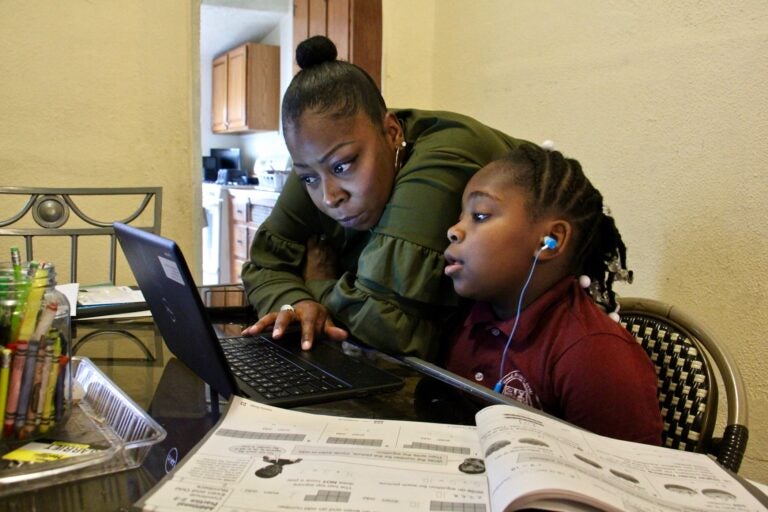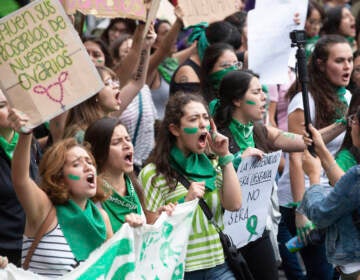The struggle is real for working women during the pandemic
Not only are women serving as caregivers for family members and monitors over their children's virtual learning, but they're also more likely to lose their jobs in 2020.
Listen 12:23
Yolanda Biggers helps her daughter, Zyiah Satterwhite, 7, find her assignment. After the coronavirus pandemic hit, Biggers gave up her shifts as a part-time nurse to focus all of her attention on Zyiah and her two older sisters as they adapted to virtual schooling. (Emma Lee/WHYY)
In January, the U.S. Department of Labor announced a milestone: For only the second time in history, and the first during a non-recession, women held the majority of jobs in the country. It was a sign of the future and of the changing American workforce. That is, until the pandemic hit.
Since March, women have been more likely than men to lose their jobs in 2020, and four times more likely to leave the workforce.
Why is the pandemic hitting women’s working lives the hardest? And what can be done about it? Our guest, Jovida Hill, executive director of the Mayor’s Office of Women’s Engagement, explains some of the challenges that working women face during the pandemic.

Hear the whole story on The Why
Interview highlights
Jovida Hill on why the pandemic is hitting working women so hard
You have to think about who are the essential workers, and the essential workers are women in health care, women and childcare, women in retail…and these women are mostly Black and brown women. They’re bearing the heavy burden. As essential workers, that means they’re more in jeopardy of contracting COVID-19 having to work every day in hazardous conditions. Also, some of those jobs have disappeared. Women have a higher rate of unemployment during the pandemic. Women are also primarily handling the home schooling because their children are in the situation of virtual learning. Whatever the the economic condition of women had been before the pandemic, it’s even worse now.
On the struggle working mothers have faced during the pandemic
One woman I know has been working from home and home schooling two young children…and she has help, and that help is her husband. So he’s working from home, and they share the child care, they share in the home schooling. They adjust their work schedules to accommodate the children’s schedules. And it’s stressful, but it’s manageable. It’s easier to manage this pandemic when you have resources. ..but there’s so many women in our city whose resources are minimal.
On what women say they need
One of the things that kept coming up over and over again was better pay increase wages. And it’s almost as if you take two steps forward and then five steps back…It took the city of Philadelphia 3-1/2 years to get our wage equity bill passed. And it was a simple bill. All it required is that employers not ask prospective applicants their wage history, because traditionally that salary history question would often put women and minorities in low paying jobs their entire working lives. And so we were able to enact it and, bam, the pandemic happened.
WHYY is your source for fact-based, in-depth journalism and information. As a nonprofit organization, we rely on financial support from readers like you. Please give today.






